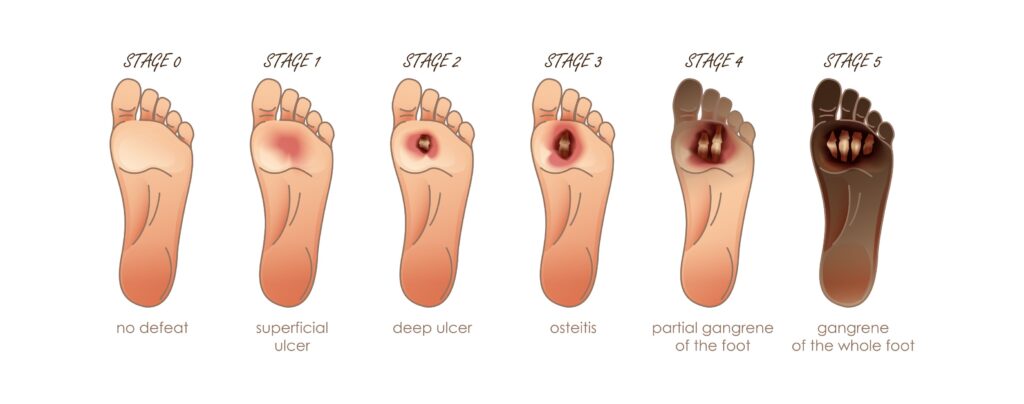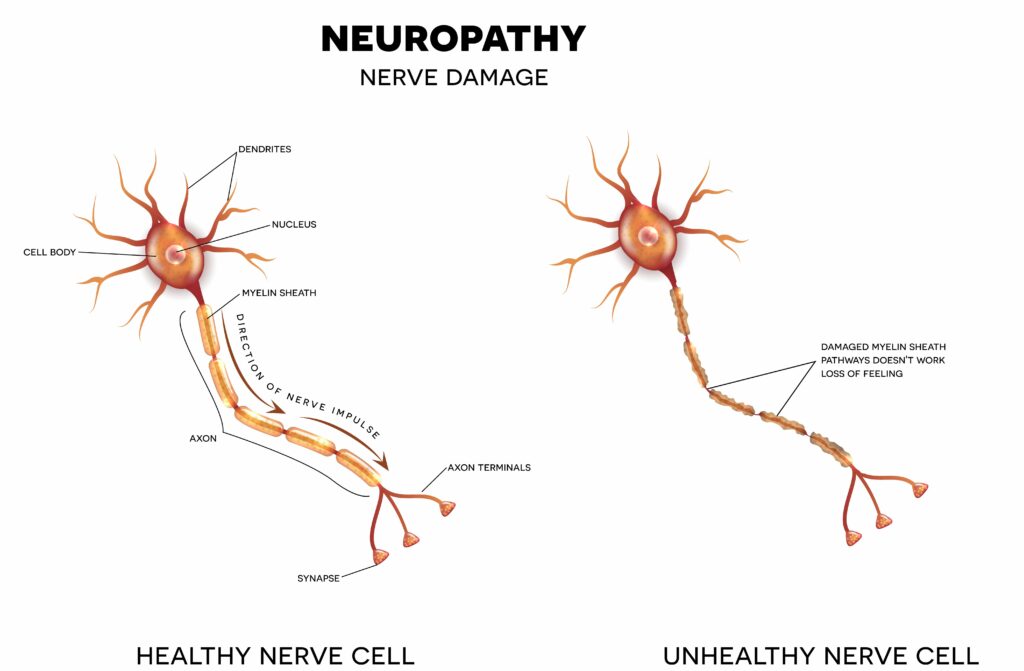If you suffer from diabetes, you should take good care of your feet because of your increased risk of foot ulcers, foot calluses, heel fissures, neuropathy, and damage to blood vessels leading to limb ischaemia. Nearly half of all hospital emissions of diabetes sufferers are due to leg and foot problems. Ulcers, in particular, can lead to life-changing surgery.
Statistics relating to foot ulcers
- 10% of sufferers have a diabetic foot ulcer at some time in their life.
- There are 130 foot amputations each week in the UK. 80% of these are due to diabetic foot ulcers, and 80% of these could be prevented.
- 70% of amputees die within five years of amputation.
- 50% of diabetes sufferers who have a foot ulcer die within five years.
- There are 300 new ulcers per day diagnosed in the UK.
- Toe amputations are increasing in the UK.
With this in mind, we can see why you should check your feet daily if you have diabetes. You should also have an annual foot check as part of your diabetes annual review.

What is neuropathy?
Neuropathy is damage to the nerve serving any part of the body and can be broadly divided into two groups.
- Peripheral neuropathy affects nerve supply in the skin and muscles.
- Autonomic neuropathy affects nerve supply organs such as the bladder, bowel, heart, and those responsible for controlling blood pressure.
A further group is diffuse neuropathy. This affects the sensory and autonomic nerves and is the one most likely to affect the feet.
What are the symptoms of neuropathy?
- A tingling or buzzing in the feet, which is often worse at night.
- Pins and needles can become intense or an intense burning sensation like a painful numbness.
- Cramp-like muscle pain.
- A loss of temperature perception in hands and feet. Often feeling less sensitive to heat but more sensitive to cold.
- Extreme skin sensitivity, for example, wearing socks irritates the skin and feels like an allergic reaction.

You are at moderate risk of developing a diabetic foot ulcer if you suffer from neuropathy.
Damage to blood cells and limb ischaemia
When blood vessels are damaged, it prevents blood from getting to the skin, muscles and tissues, which means that limb injuries heal less quickly. This can lead to ulceration.
What are the symptoms of ischaemia?
- Cramp in calves
- Shiny, smooth skin
- Loss of hair on feet and legs
- Thickened toenails
- Cold, pale feet
- Wounds and sores on feet
- Pain in feet when feet are raised
What is limb ischaemia?
This is where blood flow to your hands, feet and legs is severely obstructed. It can cause severe pain, sores and skin ulcers. Non-critical limb ischaemia puts you at moderate risk of a diabetic foot ulcer.
Both neuropathy and limb ischaemia in conjunction with calluses, deformity, or each other put you at high risk of a diabetic foot ulcer.
Consult a podiatrist for peace of mind
For some people, checking their feet is physically difficult. Others like the reassurance of knowing a specialist is caring for their feet and will pick up on any likely problems early. Regular podiatry care will help to ensure your toenails are trimmed correctly, corns and calluses are treated, your feet are well moisturised to prevent cracks and sores, and you can get immediate advice if you have more serious problems.
Make sure you choose a qualified podiatrist by looking out for the following qualifications:
- BSc (Hons) or DPodM – full-time honours degree in podiatry
- STCh – registered with the Health and Care Professions Council (HCPC)
- MChS or FChS – member of The Society of Chiropodists and Podiatrists
- F.C.Pod(S) – further qualification in surgery.
At Lymington Chiropractic Clinic, we are fortunate to have registered H.C.P.C podiatrist Paul Gray D.Pod, M.R.C. POD., S.R.CH in clinic on Friday afternoons and Saturday mornings. Paul has over 40 years of experience, including working in the NHS. So, if you have any concerns about your feet, especially if you have diabetes, call Paul on 07857 137732 for an appointment.
We are grateful for the information provided by the Independent Diabetes Trust in the booklet Diabetes Looking After Your Feet. If you would like further information on diabetes, you can contact them for FREE leaflets at [email protected], call their HELPLINE on 01604 622837 or visit www.iddtinternational.org
#worlddiabetesday


